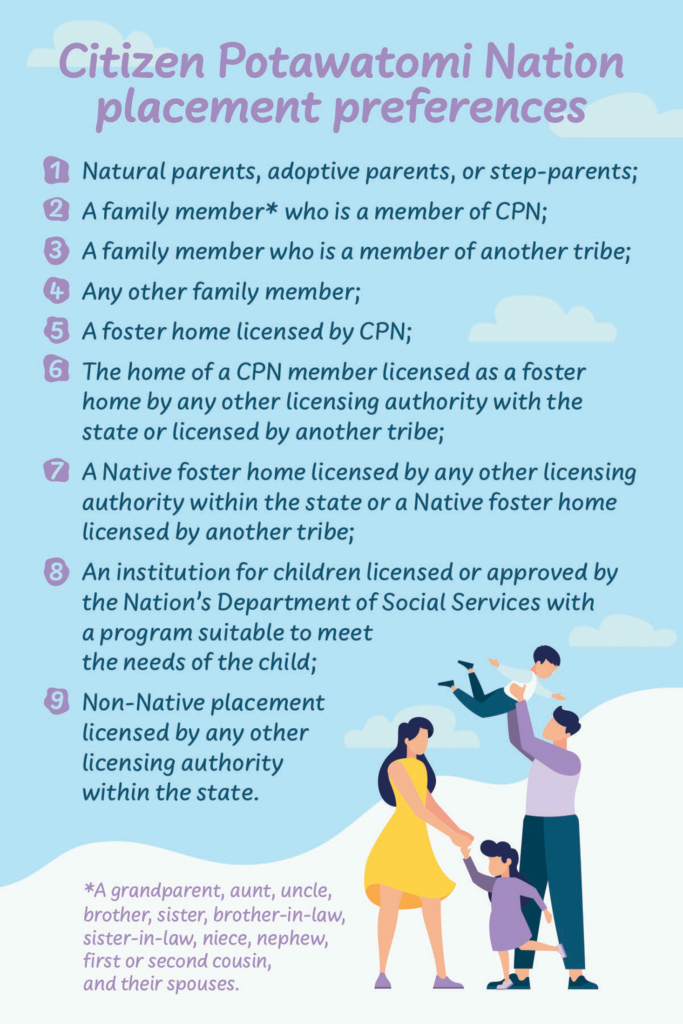In 2022, the states of Texas, Louisiana and Indiana, as well as individual plaintiffs, challenged the constitutionality of the Indian Child Welfare Act (ICWA). The U.S. Supreme Court upheld the constitutionality of the act in a 7-2 vote, June 15, 2023. Citizen Potawatomi Nation staff recently weighed in on the decision and how it affects the Tribe.
History
Congress enacted ICWA in 1978 in response to decades of state officials and private parties removing Native American children from their families and culture at an alarmingly high rate.
CPN Tribal Attorney George Wright explained Congress decided to enact ICWA with care and forethought.
“It was based on trying to correct or ameliorate or just arrest decades of deliberate federal action to try to discriminate against Native people, to try to separate children from their parents, culture, home, or the place where their relatives are, deliberately and on purpose,” he said.
Wright’s explanation shows how ICWA helps ensure that Native children stay connected to their tribes, despite the long history of discrimination against Native people.
2023 ruling
The Haaland v. Brackeen case began when the Brackeen family adopted a Navajo boy. However, Navajo Nation interposed the adoption and wanted to place the Native boy with a Native family. As a result, one of the arguments made in the case was that ICWA violated the right to equal protection under the law, which prevents government discrimination based on race and gender. ICWA gives Native American families preferential treatment in child custody cases, and the Brackeen family felt ICWA was racially discriminatory against non-Native people who want to adopt a Native child.
“Nowhere in the history of American law has Native or non-Native status been considered a racial classification. It’s a citizenship classification,” said Wright, explaining that Native American tribes are sovereign government entities.
The Supreme Court’s decision to uphold the constitutionality of ICWA is a major victory for Native American children and families.
In a concurrence to the opinion, U.S. Supreme Court Justice Neil Gorsuch wrote that the Court’s decision “safeguards the ability of tribal members to raise their children free from interference by state authorities and other outside parties.”
The decision reaffirmed the importance of ICWA in protecting the best interests of Native American children and ensuring that they can maintain their cultural heritage.
“We now have a pretty great success rate in drastically reducing the number of kids that are removed from homes or removed in a permanent way, and of connecting with family members or other tribal members who are willing to step in and help where parents are struggling,” Wright explained.
FireLodge
CPN’s FireLodge Children & Family Services handles all adoption and foster care cases involving Potawatomi children who are enrolled or eligible for enrollment, regardless of where they live in the United States. Once a case transfers to a Tribal court setting, Citizen Potawatomi Nation follows their own Tribal code.
“It is actually really unique in that the placement preferences differ a little bit than ICWA,” Director of FireLodge Children & Family Services Ashlee May explained. “So, we actually hold our Citizen Potawatomi family to a higher placement preference.”
The Tribal code prioritizes family for Tribal children and seeks to maintain the child’s connections to extended family, Tribe and other Native American families. If the family is not a good fit for the child, they look to Tribal foster homes approved by the CPN Foster Care & Adoption Program.
FireLodge has met with adversity while protecting Tribal children. For example, they have received racist comments from non-Native people. They have also faced not being invited to out-of-state court hearings while awaiting the Supreme Court decision. However, the staff at FireLodge hope to see an immediate effect in their cases following the ICWA ruling.
“Equity is something that we advocate and fight for every single day in our cases across the United States,” May said.
She hopes that ruling ICWA constitutional will “negate future litigation surrounding it.”
While CPN and FireLodge still face challenges in their cases, May said the Supreme Court ruling is “a huge win for Tribal children, Tribal families, Tribes in general.”
For more information about FireLodge, please visit cpn.news/firelodge. To read the full ICWA decision, please visit cpn.news/ICWAdecision. Learn more about National Indian Child Welfare at nicwa.org.

